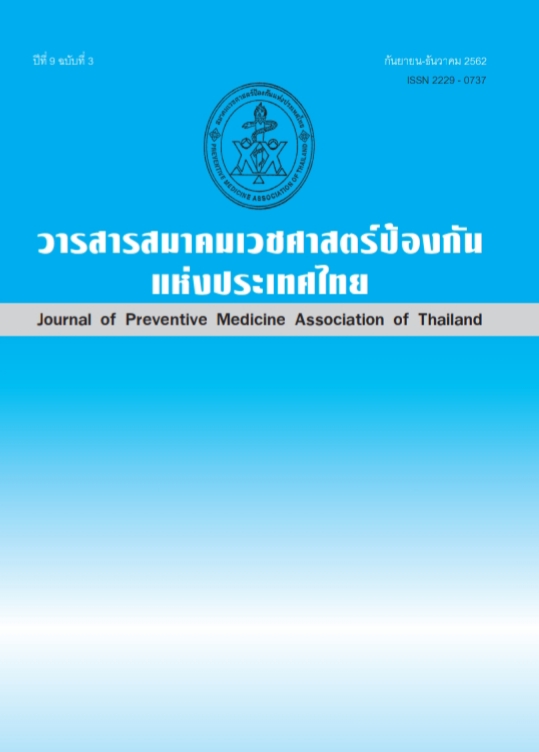A Caring Model Development for Alcohol Drinkers by Network Partners of the Nadun District
Keywords:
Mindfulness-based cognitive therapy, Caring model for alcohol drinkers by network partners, alcoholAbstract
In this study, the research to develop a caring model for alcohol drinkers by network partners’ involvement of the Nadun District. The research was conducted by applying a participatory action research (PAR), using PAOR framework (Kemmis and Mctarggart) and selecting a purposive sampling, including informants and brainstorming groups: 86 people overall, consisting of multidisciplinary teams, drinkers, caretakers, community leaders, village health volunteers, and 25 people attending the Mindfulness-based cognitive therapy program. Duration of studies: from June 2017 to January 2018 consisting of 4 phases-Phase 1: Problem Identification by establishing people forums and filtered by using ASSIST and AUDIT software; Phase 2: The model development according to the action plan; Phase 3: The model implementation by providing a knowledge towards intoxications from alcohol consumption, beginning a treatment, and following up results; and Phase 4: Performance Evaluation by gathering and analyzing qualitative data, examining a reliability and validity by using Triangulation Methods in a quantitative approach-demonstrating the results in means and percentages. The results indicated that: Phase 1: found out that in 25 alcohol drinkers, 20 people were classified as alcoholics, 5 people were classified as risky drinkers. The services also did not meet the standard; Phase 2: formed a team to develop a caring model for alcohol drinkers, established plans, and improved the 8-step treatment model for the mindfulness-based cognitive therapy; Phase 3: applied a caring model for hospitals, health promoting hospitals, and community; and Phase 4: formed patterns, procedures, and networks, according to the campaign “Save Life, Save Health”, with a 96% having a better quality of life, satisfied their families, abstained from an alcohol drinking for 22 people, amounts to 88 percent, 3 people reduced drinking habits and completed 100 percent of the treatment procedures. The research limitations is a study derived from a single community which requires further development of the research.
References
2. National Statistical Office. The survey on smoking behavior and alcohol consumption in the population 2014. Bangkok:The Office; 2015.
3. Thavorncharoensap M, Teerawattananon Y, Chaikledkaew U, Lertpitakpong C, Yothasamut J, Thitiboonsuwan K, et al. A study on costs of social, health and economics of alcohol consumption in Thailand. Bangkok:Health Intervention and Technology Assessment Program; 2008.
4. Finney JW. Assessing treatment and treatment process. In:Allen JP, Wilson VB, editors. Assessing alcohol problems. California:Department of Veterans Affairs and Stanford University Medical Center; 2003; p.189-218.
5. Jittichairoj K. The study of alcoholic rehabilitation program. Conference of the Ministry of Public Health for the 12th; 2004 Aug 24-27; Royal Phuket City Hotel, Phuket. Khon Kaen: KhonKaen Rajanagarindra Psychiatric Hospital; 2004. p.246.
6. Moolsart J. Alcohol treatment guidelines: experience in Sapphasitthiprasong Hospital. Documents for the 1st symposium of alcoholics. Ubon Ratchatani: Sapphasitthiprasong Hospital; 2005.
7. Skinner MD, Aubin J. Craving’s place in addiction theory: Contribution of the major models. Neuroscience and Biobehavioral Reviews 2010;34:606-23.
8. Bevan E. The effect of mindfulness training on drug craving is moderated by level of negative affect. A Doctoral project in Clinical Psychology: Marywood University; 2010.
9. Kabat-Zinn J. Full catastrophe living: Using the wisdom of your body and mind to face stress, pain, and illness. New York: Dell; 1990.
10. Marlatt G, Witkiewitz K, Dillworth T. Vipassana meditation as a treatment for alcohol and drug use disorders. In S. C. Hayes, V. M. Follette, & M. M.linehan (Eds.), Mindfulness and acceptance: Expanding the cognitive-behavioral traditional. NY: Guilford Press; 2004.
11. Kemmis S, Mc Taggart R. The action research planner. 3rded. Victoria:Deakin University press; 1990.
12. ยงยุทธ วงศ์ภิรมย์ศานติ์. คู่มือสติบำบัด [Mindfulness-Based Therapy and Counseling (MBTC) Manual]; 2559.
Downloads
Published
How to Cite
Issue
Section
License
บทความที่ลงพิมพ์ในวารสารเวชศาสตร์ป้องกันแห่งประเทศไทย ถือเป็นผลงานวิชาการ งานวิจัย วิเคราะห์ วิจารณ์ เป็นความเห็นส่วนตัวของผู้นิพนธ์ กองบรรณาธิการไม่จำเป็นต้องเห็นด้วยเสมอไปและผู้นิพนธ์จะต้องรับผิดชอบต่อบทความของตนเอง






